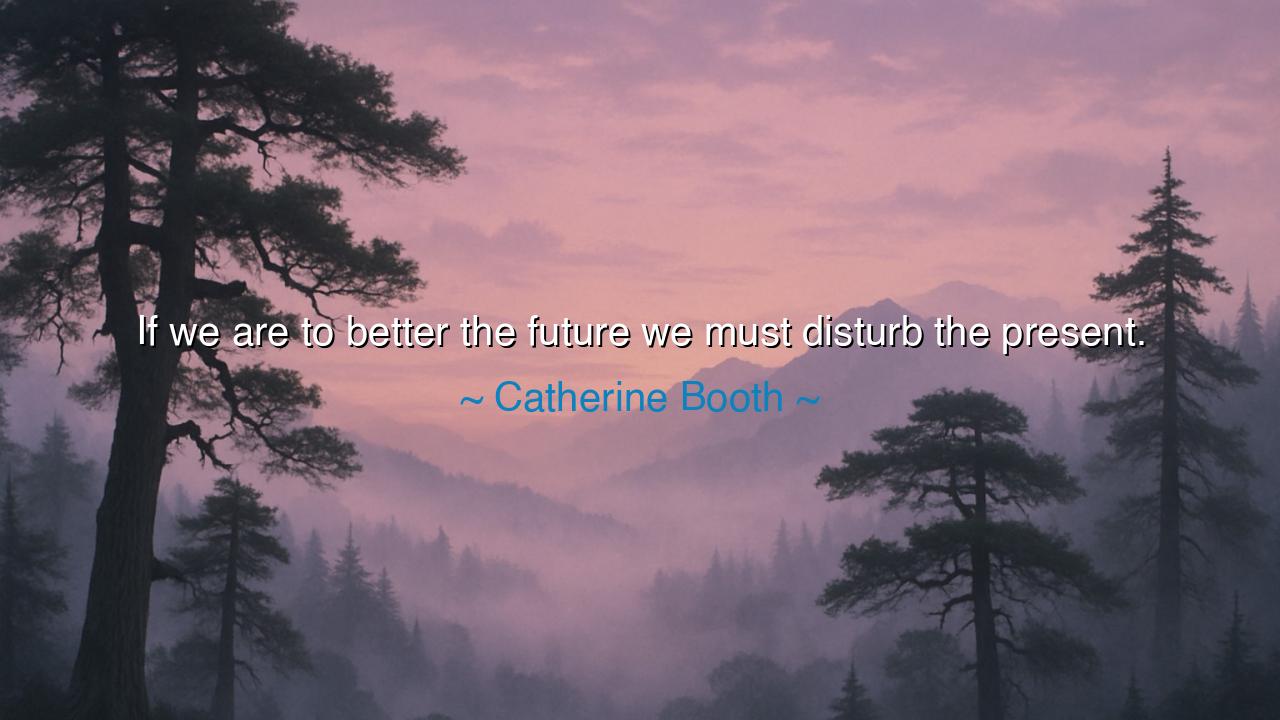
If we are to better the future we must disturb the present.






In the great cycle of time, the world turns as it always has, yet in the heart of each generation, there comes a call for change—a call to disturb the stagnant waters of the present in order to shape the future. Catherine Booth, in her stirring words, “If we are to better the future, we must disturb the present,” speaks to a profound and ancient truth. The present, so often comfortable in its patterns and routines, must be disrupted in order for growth to occur. It is through the disturbance of today that the seeds of a better tomorrow are planted.
This is not a call for chaos for chaos’s sake, nor a reckless disregard for order. Rather, Booth’s words reflect the age-old wisdom that change is often born from discomfort. The philosophers of old, such as Heraclitus, understood this well. He believed that life is in constant flux and that the very nature of existence requires a constant disturbance, a dynamic tension that forces us to evolve and grow. For a river to flow forward, it must first carve through the rock, disturbing the earth to create a path. So too must the present be disturbed if we are to reshape the future.
Consider the great revolutions in history—moments where the status quo was shaken to its core in order to birth something new. Mahatma Gandhi, a man of peace, stirred the hearts and minds of millions with his call for nonviolent resistance to British colonial rule. He did not accept the conditions of his time as unchangeable. Instead, he disturbed the present through acts of civil disobedience, demanding a new path forward, one where the future of India could be governed by its own people. His disturbance of the present led to the creation of a free nation, proving that change is not a passive thing; it requires action, often disruptive, to carve a new course.
Similarly, consider the story of Martin Luther King Jr., whose words and actions disturbed the deeply entrenched systems of racial injustice in the United States. His leadership in the Civil Rights Movement was not about accepting things as they were; it was about stirring the souls of people to demand a better, more just future. King’s call to disturb the present was a call to action in the face of oppressive forces. Through peaceful protest, marches, and speeches, he disturbed the comfort of the status quo and paved the way for monumental social change.
Disturbing the present is not always about large-scale movements or sweeping revolutions; sometimes, it is the quiet disturbance within our own hearts and minds. It is about the willingness to question the assumptions of our time, to disrupt the cycles of complacency that hold us in place. Take the example of Rosa Parks, whose simple but powerful act of refusal to give up her seat on a bus was a moment of disturbance that ignited a larger movement for civil rights. Her act of defiance was not one of violence or chaos but a quiet rebellion against the injustice of the present, a rebellion that ultimately helped to reshape the future of America.
The lesson, then, is clear: to create a better future, we must have the courage to disturb the present. Change does not come from sitting idly by, waiting for circumstances to improve on their own. It comes from those willing to question, to challenge, and to disrupt the norms that bind us. Whether it is through large-scale social movements or small acts of personal courage, the future will only be better if we choose to disturb the present. The path forward is carved not by comfort but by action, by the willingness to face discomfort and dismantle the barriers that prevent growth.
In our own lives, we must ask ourselves: How can we disturb the present to create a better future? Are we willing to challenge the conventions of society, to push against the limits that have been placed before us? Each of us has the power to make a difference, whether by standing up for what we believe in or by simply questioning the way things are. The future is not something that happens to us—it is something that we must actively shape, and to do so, we must disturb the present with the courage and vision to build a better tomorrow. Let us embrace the wisdom of Catherine Booth and the great leaders who have come before us, knowing that only through disturbance can true transformation begin.






AAdministratorAdministrator
Welcome, honored guests. Please leave a comment, we will respond soon